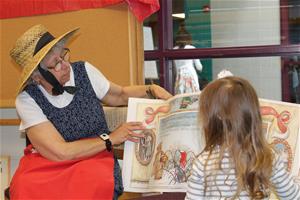 Like thousands of literacy educators around the world, members of the Greater Boston Reading Council (GBC) reach out to parents and children in order to help them experience literature and to develop a love of reading. One of the initiatives we are most proud of that accomplishes this lofty goal is our annual Storybook Character Breakfast, which fosters an appreciation of literacy and exposes children to books, all while providing a wealth of ideas for parents to try at home.
Like thousands of literacy educators around the world, members of the Greater Boston Reading Council (GBC) reach out to parents and children in order to help them experience literature and to develop a love of reading. One of the initiatives we are most proud of that accomplishes this lofty goal is our annual Storybook Character Breakfast, which fosters an appreciation of literacy and exposes children to books, all while providing a wealth of ideas for parents to try at home.
The GBC, in conjunction with the Medford Family Network, has sponsored the event on the first Saturday in May for 16 years. The Medford Family Network, a fitting partner, is a parenting education and family support program that prioritizes the family structure as the child’s primary and most important learning center. It aims to serve all families in Medford, MA, a working class, urban community just six miles from Boston—one where 65 languages are spoken among the school district’s families.
On the surface, the event appears to be a simple get-together for preschool through second-grade students. But the thoughtful actions that make the day so much fun for families can have a long-lasting impact.
Held in a school setting, the Storybook Character Breakfast involves GBC volunteers dressing up using professional costumes (think beloved characters including Curious George, Rotten Ralph, Lyle the Crocodile, and George and Martha), and more than 100 children from 80 families are consistently in attendance. Along with being treated to a free breakfast, the children are able to chat with their favorite characters, play games, pose for photos, receive autographs and free books to take home, and more.
Children move among various, volunteer-run stations such as face painting, poems, and related arts and crafts, as well as a center where children can make bookmarks, learn songs and fingerplays, and listen to books and stories read by Mother Goose.
Parental involvement
Just as important as the kids’ activities, parents are offered packets of materials containing concrete suggestions for reading at home.
We distribute two versions of the A Child Becomes a Reader pamphlet, issued by the National Institute for Literacy; one is intended for birth- through preschool-age children while the other is geared toward kindergarteners through third graders. The pamphlets list ways to develop a literate home as well as provide ideas and activities parents can do with their children. Each pamphlet includes a short summary of research on how children learn to read and write.
Another pamphlet we give out is Raising a Reader, Raising a Writer, published by the National Association for the Education of Young Children. It contains suggestions for promoting literacy at home and information on what families should look for in early childhood programs.
At each station, volunteers model research-based methods of reading instruction—another important method for reaching both the reader and the parent. The volunteers particularly emphasize interactive read-alouds, communication by discussing the books before, during, and after reading, and reflection on the story or the information in the book.
At the various activity centers, volunteers demonstrate, explain, and model ways for parents to engage with their children to develop literacy, problem-solving, inquiry, observation, and collaboration skills.
Also important, the organizers ensure the community’s diversity is reflected by the volunteers and in the books that the children get to take home.
“Medford is quite diverse, so it is great to see families from all cultures and backgrounds come together in a very positive way, surrounded by resources and people who support and promote literacy in its greatest sense, in a joyful yet meaningful way,” said Marie Cassidy, a family specialist with the Medford Family Network.
A memorable experience
Not only does this breakfast nourish a love of favorite book characters, good stories, music, and fingerplays, but parents eagerly anticipate the different techniques they can learn and use at home to build on this budding enthusiasm for reading.
“More than anything, I appreciate the experience as a whole: roaming from station to station, interacting with old friends, making new ones, and learning as a parent how to encourage my children to be curious (like George!) and to explore,” said Jen O., whose 6-year-old son and 3-year-old daughter attended the event. “It seems they use all their senses at this event, and I get to take home a great packet of helpful ideas to further my children’s healthy growth and development.”
Saima A., the mother of a 5-year-old boy, agreed. “We have such a wonderful time at this event each year,” she said. “My son carefully chooses his free book and drags me to the Story Station to listen to several stories. I have learned some interesting ‘tricks’ from the readers, ways to keep him engaged, thinking, and discovering new ideas through the books.”
Getting children interested in literature is truly a major achievement, and bringing their parents into the mission is vital. This event is a way other councils—or any group—can achieve such important goals.
Replicating GBC’s Storybook Character Breakfast, whether sponsored by a preschool, an elementary school, the family-school organization, Title I, or a local reading council, is not difficult and the rewards are tremendous.
Ruth J. Berg, an ILA member for more than 25 years, has served for nearly 30 years as a reading specialist at the Cotting School in Lexington, MA. She is a former Greater Boston Reading Council president, Celebrate Literacy Award recipient, and a Massachusetts Reading Association Literacy Award recipient. She is active in both organizations and serves on their boards.